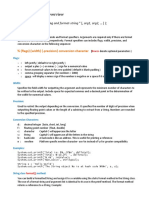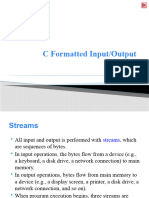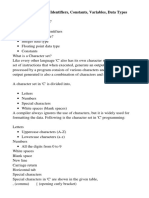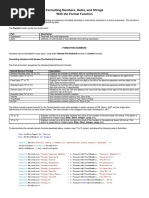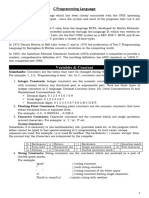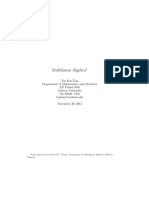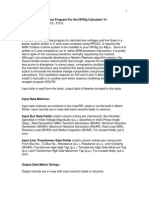Data Type in C++: Signed, Unsigned, Short, and Long (Type Modifiers)
Data Type in C++: Signed, Unsigned, Short, and Long (Type Modifiers)
Uploaded by
ashimsarkar2006Copyright:
Available Formats
Data Type in C++: Signed, Unsigned, Short, and Long (Type Modifiers)
Data Type in C++: Signed, Unsigned, Short, and Long (Type Modifiers)
Uploaded by
ashimsarkar2006Original Title
Copyright
Available Formats
Share this document
Did you find this document useful?
Is this content inappropriate?
Copyright:
Available Formats
Data Type in C++: Signed, Unsigned, Short, and Long (Type Modifiers)
Data Type in C++: Signed, Unsigned, Short, and Long (Type Modifiers)
Uploaded by
ashimsarkar2006Copyright:
Available Formats
Data type in C++
Type Length Range
unsigned char 8 bits 0 to 255
char 8 bits -128 to 127
enum 16 bits -32,768 to 32,767
unsigned int 16 bits 0 to 65,535
short int 16 bits -32,768 to 32,767
int 16 bits -32,768 to 32,767
unsigned long 32 bits 0 to 4,294,967,295
long 32 bits -2,147,483,648 to 2,147,483,647
float 32 bits 3.4 * (10**-38) to 3.4 * (10**+38)
double 64 bits 1.7 * (10**-308) to 1.7 * (10**+308)
long double 80 bits 3.4 * (10**-4932) to 1.1 * (10**+4932)
signed, unsigned, short, and long (type modifiers)
A type modifier alters the meaning of the base data type to yield a new type. Each of these type
modifiers can be applied to the base type int. The modifiers signed and unsigned can also be
applied to the base type char.
In addition, long can be applied to double. When the base type is omitted from a declaration,
int is assumed.
Examples:
long x; /* int is implied */
unsigned char ch;
signed int i; /* signed is default */
unsigned long int l; /* int OK, not needed */
char (keyword) Character data type
Variables of type char are 1 byte in length. They can be signed (default) or unsigned.
int (keyword) Integer data type
Variables of type int are one word in length.They can be signed (default) or unsigned.
float, double and long double (keywords) Real number data types
Type Length Range
float 32 bits 3.4 * (10**-38) to 3.4 *
(10**+38)
double 64 bits 1.7 * (10**-308) to 1.7 *
(10**+308)
long double 80 bits 3.4 * (10**-4932) to 1.1 *
(10**+4932)
Use of double or float requires linking in the floating-point math package.
printf Commands
printf Format Specifiers
In ...printf format strings, format specifiers have the following form:
% [flags] [width] [.prec] [F|N|h|l|L] type_char
Each format specifier begins with the percent character (%).
After the % come the following, in this order:
Component What It Controls or Specifies
[flags] (Optional) Flag character(s)
Output justification, numeric signs, decimal
points, trailing zeros, octal and hex
prefixes
[width] (Optional) Width specifier
Minimum number of characters to print,
padding
with blanks or zeros
[.prec] (Optional) Precision specifier
Maximum number of characters to print; for
integers, minimum number of digits to print
[F|N|h|l|L] (Optional) Input size modifier
Override default size of next input argument
N = near pointer h = short int
F = far pointer l = long int
L = long double
type_char (Required) Conversion type character
printf Precision Specifiers
printf Flag Characters
The ...printf flag characters specify output justification, numeric signs, decimal points,
trailing zeros, and octal and hex prefixes.
The flag characters can appear in any order and combination.
What It Means
Flag
- Left-justifies the result, pads on the right
with blanks.
If not given, right-justifies result, pads on
left with zeros
or blanks.
+ Signed conversion results always begin with a
plus (+) or
minus (-) sign.
blank If value is non-negative, the output begins
with a blank
instead of a plus; negative values still begin
with a minus.
# Specifies that arg is to be converted using an
"alternate form"
Plus (+) takes precedence over blank ( ) if both are given.
The ...printf precision specifiers set the maximum number of characters (or minimum number of
integer digits) to print.
A printf precision specification always begins with a period (.) to separate it from any
preceding width specifier.
Then, like [width], precision is specified in one of two ways:
directly, through a decimal digit string
indirectly, through an asterisk (*)
If you use an "*" for the precision specifier, the next argument in the call (treated as an int)
specifies the precision.
If you use asterisks for the width or the precision, or for both, the width argument must
immediately follow the specifiers, followed by the precision argument, then the argument for the
data to be converted.
How Output Precision Is Affected
[.prec]
(none) Precision set to default:
= 1 for d, i, o, u, x, X types
= 6 for e, E, f types
= All significant digits for g, G types
= Print to first null character for s types
= No effect on c types
.0 For d, i, o, u, x types, precision set to
default;
for e, E, f types, no decimal point is
printed.
.n n characters or n decimal places are printed.
If the output value has more than n
characters, the
output might be truncated or rounded. (Whether
this
happens depends on the type character.)
* The argument list supplies the precision
specifier,
which must precede the actual argument being
formatted.
No numeric characters will be output for a field (i.e., the field will be
blank) if the following conditions are all met:
you specify an explicit precision of 0
the format specifier for the field is one of the integer formats (d, i, o, u, or x)
the value to be printed is 0
How [.prec] affects conversion
Type
Char Effect of [.prec] (.n) on Conversion
d Specifies that at least n digits are
i printed.
o If input argument has less than n
u digits, output value is left-padded
x with zeros.
X If input argument has more than n
digits, the output value is not
truncated.
e Specifies that n characters are
E printed after the decimal point, and
f the last digit printed is rounded.
g Specifies that at most n significant
G digits are printed.
c Has no effect on the output.
s Specifies that no more than n
characters are printed.
printf Conversion-Type Characters
The information in this table is based on the assumption that no flag characters, width
specifiers, precision specifiers, or input-size modifiers were included in the format specifier.
NOTE: Certain conventions accompany some of these format specifiers.
Type
Char Expected Input Format of output
Numerics
d Integer Signed decimal integer
i Integer Signed decimal integer
o Integer Unsigned octal integer
u Integer Unsigned decimal integer
x Integer Unsigned hexadecimal int (with a, b, c, d, e, f)
X Integer Unsigned hexadecimal int (with A, B, C, D, E, F)
f Floating point Signed value of the form [-]dddd.dddd.
e Floating point Signed value of the form [-]d.dddd or e[+/-]ddd
g Floating point Signed value in either e or f form, based on
given value and precision. Trailing zeros and
the decimal point are printed if necessary.
E Floating point Same as e; with E for exponent.
G Floating point Same as g; with E for exponent if e format used
Characters
c Character Single character
s String pointer Prints characters until a null-terminator is
pressed or precision is reached
% None Prints the % character
Pointers
n Pointer to int Stores (in the location pointed to by the input
argument) a count of the chars written so far.
p Pointer Prints the input argument as a pointer; format
depends on which memory model was used. It will be
either XXXX:YYYY or YYYY (offset only).
Infinite floating-point numbers are printed as +INF and -INF. An IEEE Not-A-Number is printed as
+NAN or -NAN.
You might also like
- Format Conversions:: Printf, Fprintf, SprintfDocument3 pagesFormat Conversions:: Printf, Fprintf, SprintfDinesh LasanthaNo ratings yet
- C - PrintfDocument3 pagesC - PrintffabioscanNo ratings yet
- How String WorksDocument13 pagesHow String WorksSagar Morje100% (1)
- COMP1511 Intro To ProgrammingDocument37 pagesCOMP1511 Intro To ProgrammingRoger ChenNo ratings yet
- Printf : Java Method OverviewDocument2 pagesPrintf : Java Method Overviewakula pranathiNo ratings yet
- Formatted Input-OutputDocument64 pagesFormatted Input-Outputaayusha766No ratings yet
- C Language Basic Chapter 4 Inputs and Outputs, Tayyab8632, Malik8632, 03445064252Document25 pagesC Language Basic Chapter 4 Inputs and Outputs, Tayyab8632, Malik8632, 03445064252maliktayyab8632100% (2)
- Datatypes and VariablesDocument31 pagesDatatypes and Variablesapi-394738731No ratings yet
- Unit 3Document20 pagesUnit 3Susheela RaoNo ratings yet
- PrintfDocument10 pagesPrintfkayak7No ratings yet
- Printf : Java Method Quick ReferenceDocument1 pagePrintf : Java Method Quick ReferencenamnblobNo ratings yet
- Built-In Variables: AWK ProgrammingDocument3 pagesBuilt-In Variables: AWK ProgrammingHarshali Y. PatilNo ratings yet
- Programming in C Chapter 3Document13 pagesProgramming in C Chapter 3samrat_2011No ratings yet
- Constants, Variables, & Data Types: Prepared By:vipul VekariyaDocument46 pagesConstants, Variables, & Data Types: Prepared By:vipul VekariyaJay TadhaniNo ratings yet
- 2 - Variables, User Input, Math FunctionsDocument9 pages2 - Variables, User Input, Math FunctionsSimon RizviNo ratings yet
- Quick Reference CDocument2 pagesQuick Reference Csidbom100% (1)
- C Reference Card (ANSI) : C 1999 Joseph H. Silverman Permissions On Back. v1.3Document2 pagesC Reference Card (ANSI) : C 1999 Joseph H. Silverman Permissions On Back. v1.3LGavri100% (1)
- CPP NotesDocument74 pagesCPP NotesSai VighneshNo ratings yet
- In OutDocument7 pagesIn OutivandjokovicNo ratings yet
- Basic I/O - PrintfDocument19 pagesBasic I/O - PrintfAnjali NaiduNo ratings yet
- Chap 2Document48 pagesChap 2Rahul PrasadNo ratings yet
- Lecture 4Document34 pagesLecture 4Abel IngawNo ratings yet
- notes set 1Document15 pagesnotes set 1suganyaNo ratings yet
- Format Conversions:: Scanf, Fscanf, SscanfDocument3 pagesFormat Conversions:: Scanf, Fscanf, SscanfDinesh LasanthaNo ratings yet
- C TokensDocument9 pagesC TokensFayaz AhmedNo ratings yet
- Java Printf Method Quick ReferenceDocument1 pageJava Printf Method Quick ReferencePhiokham SuriyaNo ratings yet
- Cprogramming ICTweek 3Document28 pagesCprogramming ICTweek 3Mr. CreeperNo ratings yet
- Elements of The C LanguageDocument14 pagesElements of The C LanguageRiya JasNo ratings yet
- Lecture 4Document34 pagesLecture 4Abel IngawNo ratings yet
- Notes-1 Fundamentals of CDocument18 pagesNotes-1 Fundamentals of Cvinitbansod276No ratings yet
- Fundamentals of I/ODocument14 pagesFundamentals of I/OBlah BlahNo ratings yet
- Getting Started With CDocument24 pagesGetting Started With CShephali SinghNo ratings yet
- 2 C Data Types, Constants, Variables, ExpressionsDocument31 pages2 C Data Types, Constants, Variables, ExpressionsAsrar TamimNo ratings yet
- Basic Types and Formatted Io 170609161349Document26 pagesBasic Types and Formatted Io 170609161349Mhssp PrincipalNo ratings yet
- Unit - II C Fundamentals & Decision Control Statements C FundamentalsDocument32 pagesUnit - II C Fundamentals & Decision Control Statements C Fundamentalsyv210904No ratings yet
- Formatting Numbers, Dates, and Strings With The Format FunctionDocument9 pagesFormatting Numbers, Dates, and Strings With The Format FunctionRyan Aditya KusumaNo ratings yet
- 05 Formatted Input OutputDocument33 pages05 Formatted Input OutputDestinyNo ratings yet
- 1_Variable,Datatype&OperatorDocument33 pages1_Variable,Datatype&OperatorMir MasrurNo ratings yet
- Constants Variables DatatypesDocument44 pagesConstants Variables DatatypesSiddharth Gupta100% (1)
- Lecture 2 - Intro To Computer and AlgorithmDocument81 pagesLecture 2 - Intro To Computer and AlgorithmaliNo ratings yet
- Basics of C LangDocument50 pagesBasics of C LangTribhuwan SrivastavaNo ratings yet
- UNIT - I-FinalDocument67 pagesUNIT - I-FinalKarthiNo ratings yet
- ECE128_LAB Assignment chapter 1Document26 pagesECE128_LAB Assignment chapter 12024230722No ratings yet
- The FunctionDocument3 pagesThe Functionstar_shine111No ratings yet
- PPS NotesDocument117 pagesPPS NotesChennamadhavuni SahithiNo ratings yet
- B Basic Combined Programming Language (BCPL) - "C"Document112 pagesB Basic Combined Programming Language (BCPL) - "C"deepakangadiNo ratings yet
- Matlab - Tutor4 - LogicDocument17 pagesMatlab - Tutor4 - LogicGemini GoelNo ratings yet
- 1 Variable, Datatype&OperatorDocument33 pages1 Variable, Datatype&Operator28 Tanvir Anjum PoushraNo ratings yet
- Lecture - 06 - Formatted Input OutputDocument32 pagesLecture - 06 - Formatted Input OutputBryan TanNo ratings yet
- Lec Note 2.1 - Characters & CosntantsDocument13 pagesLec Note 2.1 - Characters & Cosntantsapurbabarman.mtbNo ratings yet
- C Programming1Document22 pagesC Programming1Raghu M ENo ratings yet
- C program part 4Document5 pagesC program part 4karik75980No ratings yet
- C Data Type NoteDocument22 pagesC Data Type Notevickroid007No ratings yet
- Character Set & IdentifiersDocument30 pagesCharacter Set & IdentifiersSana MahmoodNo ratings yet
- Mme 238Document129 pagesMme 238api-3701823No ratings yet
- Components of C ProgramDocument64 pagesComponents of C ProgramBlah BlahNo ratings yet
- Data Types in C LanguageDocument4 pagesData Types in C Languagefaraz8385No ratings yet
- Chapter FourDocument13 pagesChapter Fourn64157257No ratings yet
- Cbjemass 07Document10 pagesCbjemass 07V.R.M SistlaNo ratings yet
- P: You Go To Class Regularly Q: You Do All Homework Problems R: You Receive Good GradesDocument21 pagesP: You Go To Class Regularly Q: You Do All Homework Problems R: You Receive Good GradesNguyen Dinh Minh (K15 HL)No ratings yet
- SolidWorks Aston Martin Ebook 02Document31 pagesSolidWorks Aston Martin Ebook 02Aan WidyanaNo ratings yet
- Tin-Yau Tam Multilinear Algebra (Lecture Notes)Document151 pagesTin-Yau Tam Multilinear Algebra (Lecture Notes)jhoan gaviriaNo ratings yet
- Transformation of Functions (Solved With Notes)Document21 pagesTransformation of Functions (Solved With Notes)cs23b1008No ratings yet
- PyCDS 05 ListsTuplesDocument18 pagesPyCDS 05 ListsTuplesKanu BabuNo ratings yet
- Ilovepdf MergedDocument93 pagesIlovepdf MergedAmar KumarNo ratings yet
- Neural Network Toolbox 6: Design and Simulate Neural NetworksDocument4 pagesNeural Network Toolbox 6: Design and Simulate Neural NetworksGigih HimawanNo ratings yet
- дискретка спасениеDocument38 pagesдискретка спасениеПарасат КуандыкNo ratings yet
- MATH 1281 Discussion Assignment Unit 1Document3 pagesMATH 1281 Discussion Assignment Unit 1Ahmed SesayNo ratings yet
- Hydrostatic Bearing DesignDocument11 pagesHydrostatic Bearing DesignChristopher Garcia33% (3)
- AHLEFEDERN coil spring manualDocument45 pagesAHLEFEDERN coil spring manualbalakarnNo ratings yet
- Unit 4 - Soft Computing - WWW - Rgpvnotes.inDocument11 pagesUnit 4 - Soft Computing - WWW - Rgpvnotes.incibew55561No ratings yet
- Grade 7 Math Lesson 3: Problems Involving Sets Teaching GuideDocument7 pagesGrade 7 Math Lesson 3: Problems Involving Sets Teaching GuideJaimarie Ciocon100% (2)
- 2212 07490Document41 pages2212 07490Simone StefaniNo ratings yet
- A Mathematician's ApologyDocument6 pagesA Mathematician's Apologypratyaygemini33% (3)
- Pert & CPMDocument24 pagesPert & CPMManinee Bhojraj DholeNo ratings yet
- Eyespace Values in Go: 1.1. Rules of Go. Go Is Played On A Square Grid With Black and White StonesDocument31 pagesEyespace Values in Go: 1.1. Rules of Go. Go Is Played On A Square Grid With Black and White StonesMelanocoryphaNo ratings yet
- SubhamDocument4 pagesSubhamRajit DuttaNo ratings yet
- Senarai Rumus KSSM SPM 20220616Document3 pagesSenarai Rumus KSSM SPM 20220616RowenJoachimNo ratings yet
- English Courses (International Undergraduate Program) Faculty of Computer Science - Universitas Indonesia For Exchange Students - Ay 2019/2020Document6 pagesEnglish Courses (International Undergraduate Program) Faculty of Computer Science - Universitas Indonesia For Exchange Students - Ay 2019/2020WH FurqaniNo ratings yet
- Natrayan 2018Document7 pagesNatrayan 2018Agastin RubanNo ratings yet
- Iare em PPT Slides and PDFDocument17 pagesIare em PPT Slides and PDFGv IareNo ratings yet
- GSLFDocument2 pagesGSLFRaul Marihuan GonzálezNo ratings yet
- Course File Advanced Solid Mechanics: Guru Nanak Dev Engineering College, LudhianaDocument13 pagesCourse File Advanced Solid Mechanics: Guru Nanak Dev Engineering College, LudhianaGagandeep KaurNo ratings yet
- Prediction of Hydrocarbon Recovery From Turbidite Sandstones With Linked-Debrite Facies Numerical Flow-Simulation StudiesDocument12 pagesPrediction of Hydrocarbon Recovery From Turbidite Sandstones With Linked-Debrite Facies Numerical Flow-Simulation StudiesJohann WolfNo ratings yet
- How to Convert Monthly Interest Rate to Annual in Excel 1Document7 pagesHow to Convert Monthly Interest Rate to Annual in Excel 1tradingviewstockscreenerNo ratings yet
- IndicesDocument15 pagesIndicesSuren DrajNo ratings yet
- Kidney Stone Paper 2Document5 pagesKidney Stone Paper 2Sania hyderNo ratings yet
- LinearizationDocument23 pagesLinearizationIzzah MaisaraNo ratings yet




